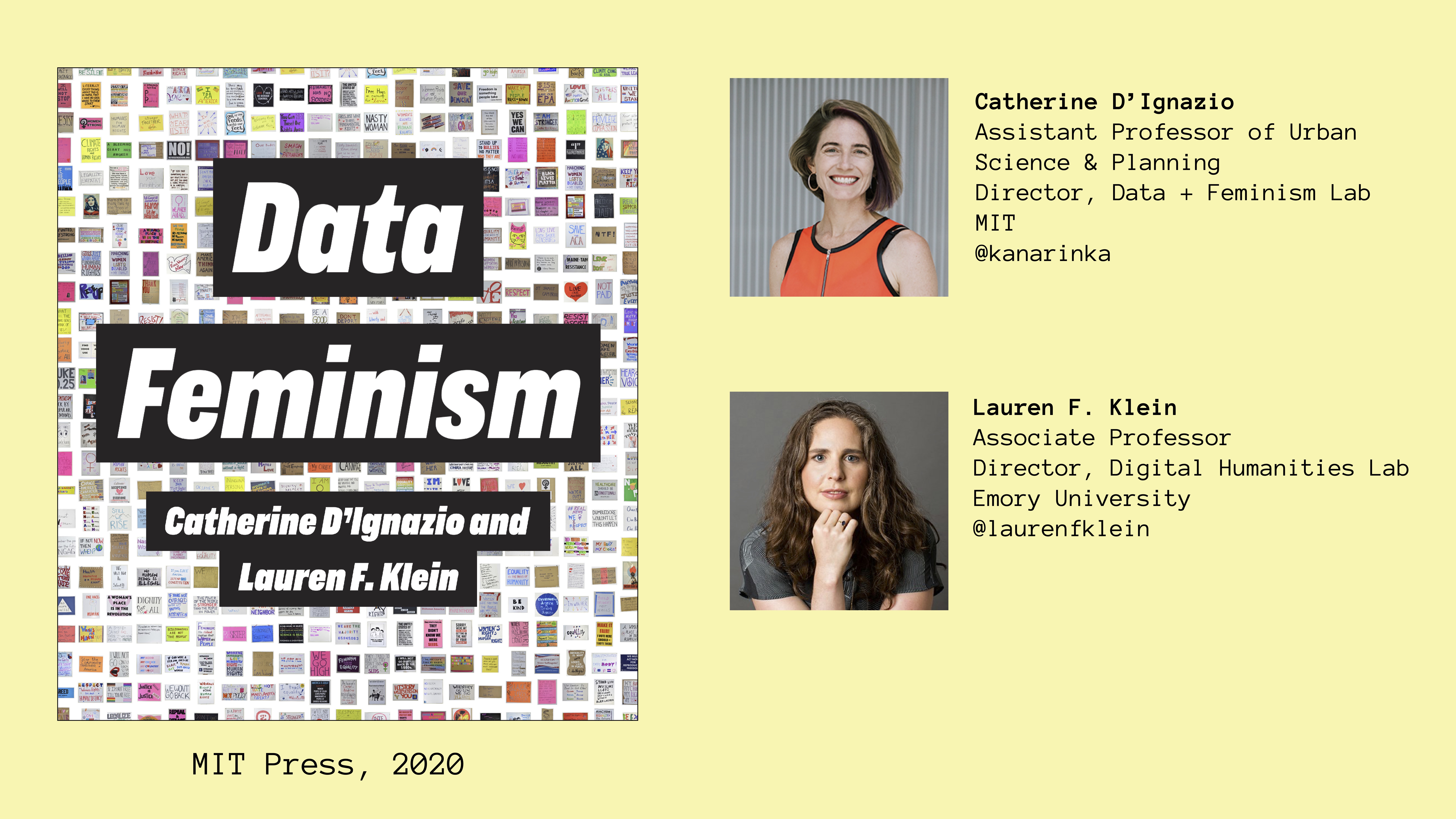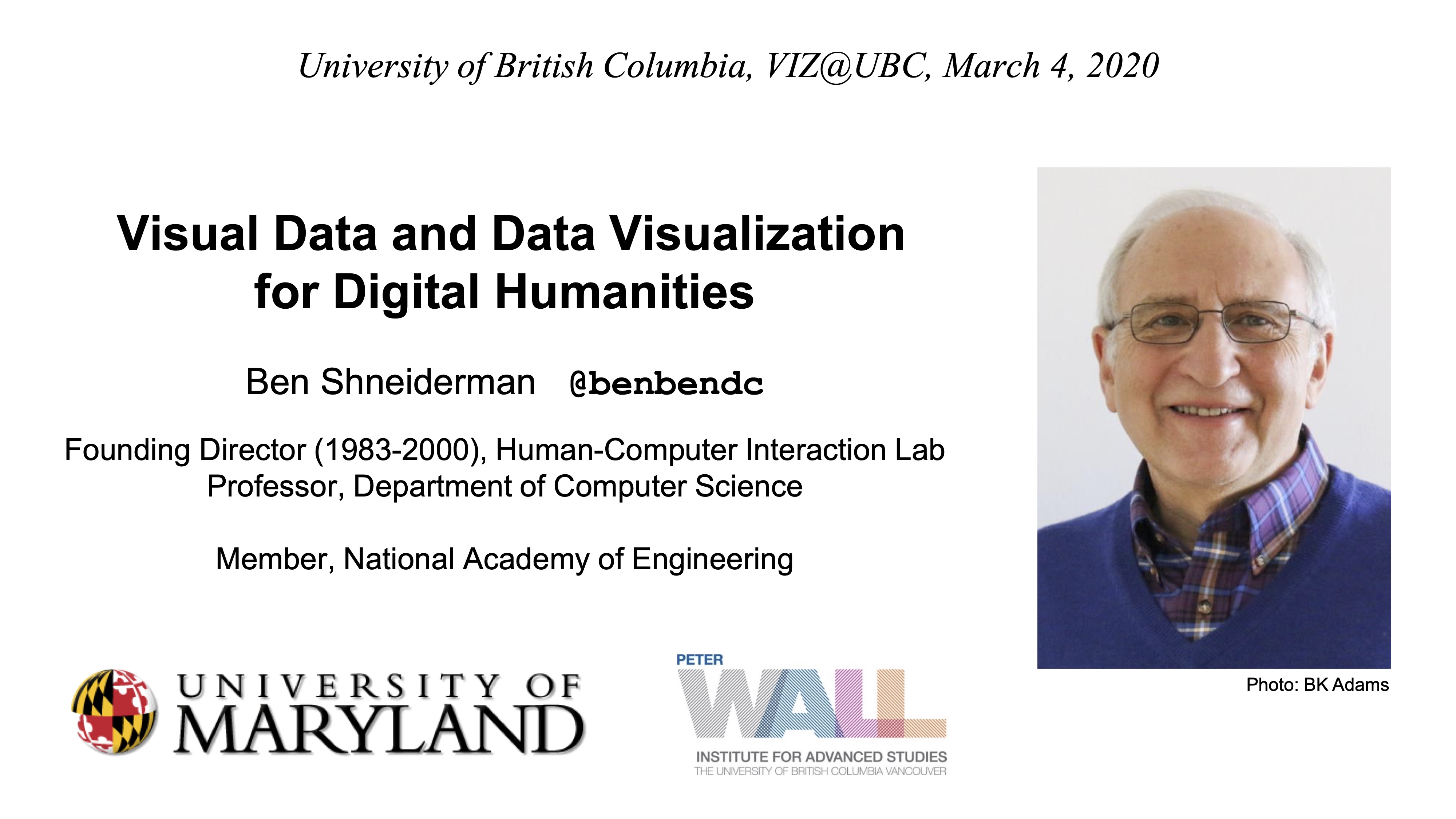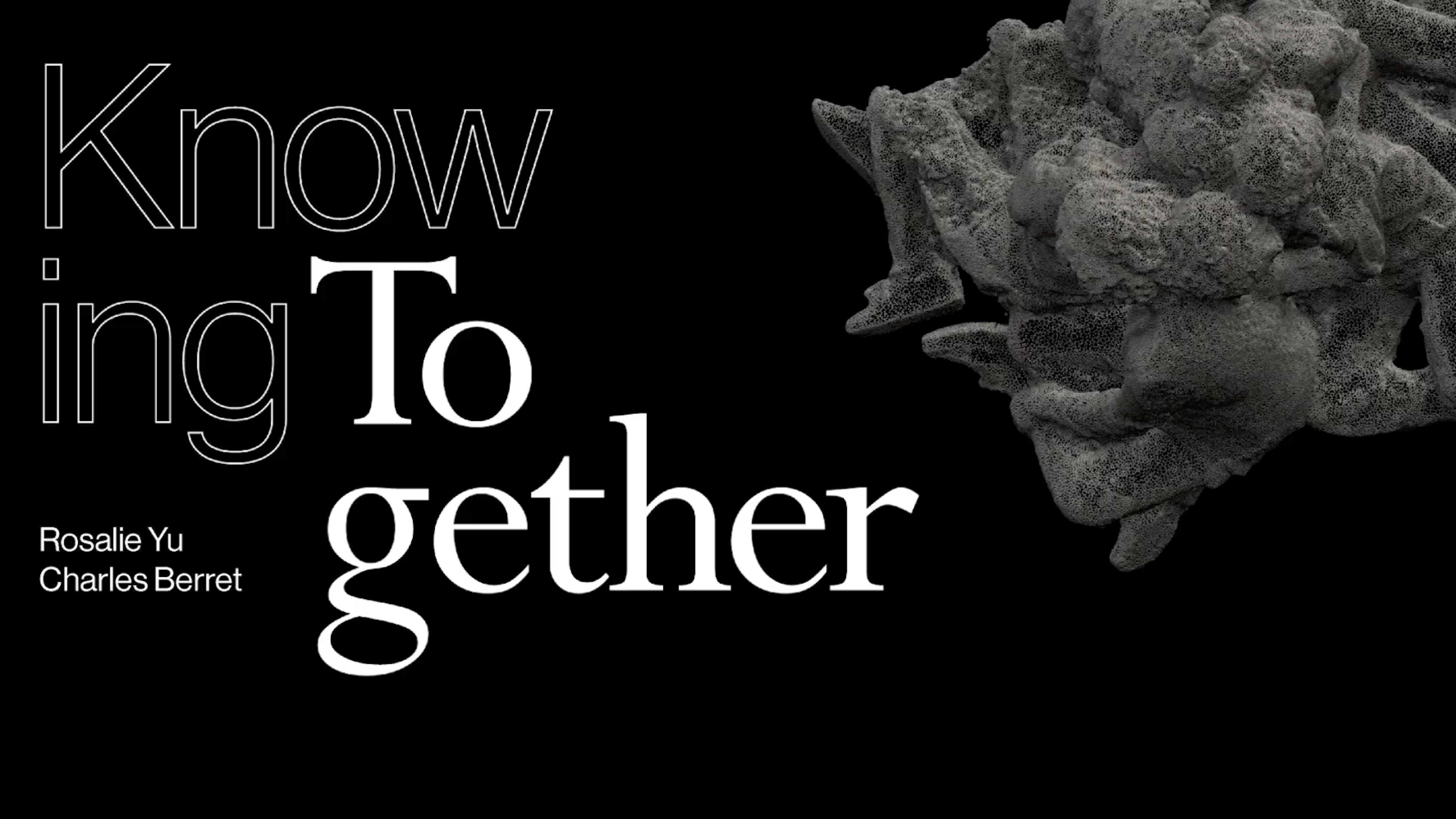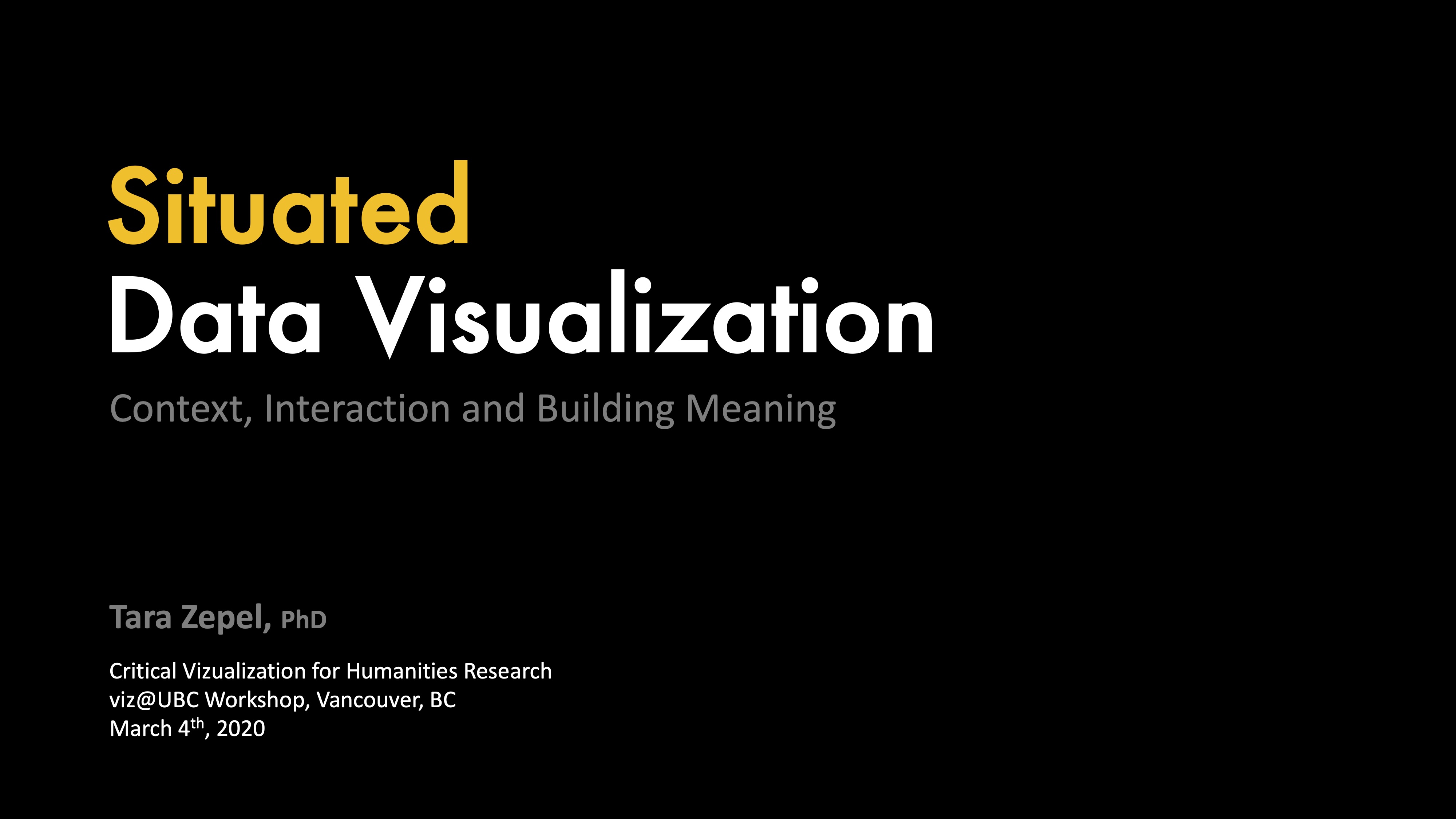Critical Visualization for Humanities Research: Designing for People, Context and Politics
Speakers: Catherine D’Ignazio (MIT Media Lab), Ben Shneiderman (Peter Wall Institute), Charles Berret (UBC Journalism), Tara Zepel (UBC Chemistry), Sheelagh Carpendale (SFU), and more.
WHO: Graduate Students, Faculty and Staff at UBC, Emily Carr, and SFU
WHERE: PWIAS Seminar Room
WHEN: March 4, 2020, Wednesday 9am-1pm
Visualization is a powerful tool for communicating and gaining insight into complex subjects. Maps, graphs, and diagrams can help us see patterns and connections that might otherwise remain hidden in data. Once uncovered, the visual means of presenting these insights can easily seem neutral and objective. And yet, every visualization promotes a certain perspective of the world, often concealing its own assumptions, gaps, and biases. The choices made in creating a visualization, who or what is represented, and the context in which it is perceived — all influence what we see and do not see. The emerging field of data feminism navigates between these two poles, both acknowledging the power of visualization techniques and also urging critical attention to the forms of power that these techniques implicitly support.
Catherine D’Ignazio
Data Feminism
Slides: (click here to download)

Bio: Catherine D’Ignazio is a hacker mama, scholar, and artist/designer who focuses on feminist technology, data literacy and civic engagement. She has run women’s health hackathons, designed global news recommendation systems, created talking and tweeting water quality sculptures, and led walking data visualizations to envision the future of sea level rise. Her forthcoming book from MIT Press, Data Feminism, co-authored with Lauren Klein, charts a course for more ethical and empowering data science practices. D’Ignazio is an assistant professor of Urban Science and Planning in the Department of Urban Studies and Planning at MIT where she is the Director of the Data + Feminism Lab.
Sheelagh Carpendale
Appreciating Our Data Heritage
(Slides forthcoming)
Abstract: Quietly, but persistently, data has been part of women's lives through the ages. Our use of data is nearly always private, often small, but has continually formed a part of how we live, organize, and make decisions in our lives. It is important that we do not let the current data revolution with all its emphasis on bigness and power, alienate us from our deep connection with data. It is important that we share the potentially empowering aspects of the use of small, situated, and embedded data.
Bio: Sheelagh Carpendale is a Full Professor at Simon Fraser University in the School of Computing Science where she directs the Innovations in Visualization (InnoVis) research group. Her research focuses on information visualization, interaction design, and qualitative empirical research. By studying how people interact with information both in work and social settings, she works towards designing more natural, accessible and understandable interactive visual representations of data. She combines information visualization, visual analytics and human-computer interaction with innovative new interaction techniques to better support the everyday practices of people who are viewing, representing, and interacting with information.
Ben Shneiderman
Visual Data and Data Visualization for Digital Humanities
Slides: (click here to download)

Bio: Ben Shneiderman is an Emeritus Distinguished University Professor in the Department of Computer Science at the University of Maryland, where he is Founding Director of the Human-Computer Interaction Lab and a Member of the Institute for Advanced Computer Studies. Currently, he is an International Visiting Scholar at the UBC Peter Wall Institute for Advanced Studies. His pioneering contributions to the fields of human-interaction and information visualization include clickable highlighted web-links, tagging for photos, dynamic query sliders for Spotfire, and the development of treemaps for viewing hierarchical data among many others.
Charles Berret
Knowing Together: An Experiment in Collaborative Photogrammetry
Slides: (click here to download)

Bio: Charles Berret is an Assistant Professor in the UBC School of Journalism, Writing and Media, recently appointed as an Affiliated Member of the Computer Science department, as well. He earned his Ph.D. at Columbia University with a dissertation on the history of cryptography in twentieth century America, and his broader work focuses on computational journalism, digital security, and freedom of the press in the digital age. As a programmer, Charles develops tools and techniques to aid journalists in conducting complicated and time-consuming investigations, currently in collaboration with the Global Reporting Centre and Institute for Investigative Journalism, where he serves on the national editorial board. His research has been published in the Journal of Visual Culture, the Journal of Communication Inquiry, and Leonardo, and his work has been supported by grants and fellowships from the Knight Foundation, the Tow Center for Digital Journalism, and the Brown Institute for Media Innovation.
Tara Zepel
Situated Data Viz: Context, Interaction & Building Meaning
Slides: (click here to download)

Bio: Tara Zepel is a data designer, visualization researcher, and teacher. She holds a PhD in Art History from UC San Diego with a specialization in data visualization. Her dissertation, Contemporary Data Visualization: A Cultural History and Close Readings, lays the groundwork for seeing data visualization as a socially and culturally situated practice, not unlike painting or film. Her work as a researcher at the Software Studies Initiative helped to develop the field of cultural analytics. She is currently a postdoc in the HeinLab at UBC, where her research focuses on visual literacy and accelerating the pace of discovery in science using rich data presentations and computer vision.
Workshop Participants:
- Tamara Munzer
- Maya Daurio
- Luke Bergmann
- Mark Turin
- Craig Thompson
- Saguna Shankar
- Shelly Rosenblum
- Jana Tyner
- Joey Takeda
- Jieun Kim
- Steve Chignell
- Ofir Sadka
- Katharine Baldwin
- Samuel Dodson
- Zakir Suleman
- Rachel Horst
- Esteban Morales
- Rachel Brydolf-Horwitz
- Gabriela Doebeli
- Anna Offenwanger
- Douglas Robb
- Yingqiu Kuang